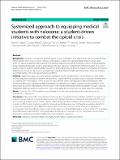Systemized approach to equipping medical students with naloxone: a student-driven initiative to combat the opioid crisis
Author(s)
Saberi, Shahin A.; Moore, Sydney; Li, Sienna; Mather, Rory Vu; Daniels, Mary B.; Shahani, Amrita; Barreveld, Antje; Griswold, Todd; McGuire, Patrick; Connery, Hilary S.; ... Show more Show less
Download12909_2024_Article_5221.pdf (842.9Kb)
Publisher with Creative Commons License
Publisher with Creative Commons License
Creative Commons Attribution
Terms of use
Metadata
Show full item recordAbstract
Background
Naloxone is an effective and safe opioid reversal medication now approved by the U.S. Food and Drug Administration (FDA) for use with or without a prescription. Despite this, naloxone dissemination lags at a time when U.S. opioid-related mortality expands. The authors proposed distributing naloxone to all U.S. medical students using established statewide standing prescription orders for naloxone, eliminating the financial burden of over-the-counter costs on students and streamlining workflow for the pharmacy. By focusing naloxone distribution on medical students, we are able to capitalize on a group that is already primed on healthcare intervention, while also working to combat stigma in the emerging physician workforce.
Methods
Beginning August 2022, the authors established a partnership between Harvard Medical School (HMS) and the outpatient pharmacy at Brigham and Women’s Hospital (BWH) to facilitate access to naloxone for HMS medical students. BWH developed a HIPAA-secure electronic form to collect individual prescription information. BWH pharmacists processed submissions daily, integrating the naloxone prescription requests into their workflow for in-person pick-up or mail-order delivery. The electronic form was disseminated to medical students through a required longitudinal addiction medicine curriculum, listserv messaging, and an extracurricular harm reduction workshop.
Results
Over the 2022–2023 academic year, 63 medical students obtained naloxone kits (two doses per kit) through this collaboration.
Conclusions
We propose that medical schools advocate for a hospital pharmacy-initiated workflow focused on convenience and accessibility to expand naloxone access to medical students as a strategy to strengthen the U.S. emergency response and prevention efforts aimed at reducing opioid-related morbidity and mortality. Expansion of our program to BWH internal medicine residents increased our distribution to over 110 healthcare workers, and efforts to expand the program to other BWH training programs and clinical sites such as the emergency department and outpatient infectious disease clinics are underway. With more than 90,000 medical students in the U.S., we believe that widespread implementation of targeted naloxone training and distribution to this population is an accessible approach to combating the public health crisis of opioid-related overdoses.
Date issued
2024-03-06Department
Harvard University--MIT Division of Health Sciences and TechnologyJournal
BMC Medical Education
Publisher
Springer Science and Business Media LLC
Citation
BMC Medical Education. 2024 Mar 06;24(1):241
Version: Final published version
ISSN
1472-6920
Keywords
Education, General Medicine